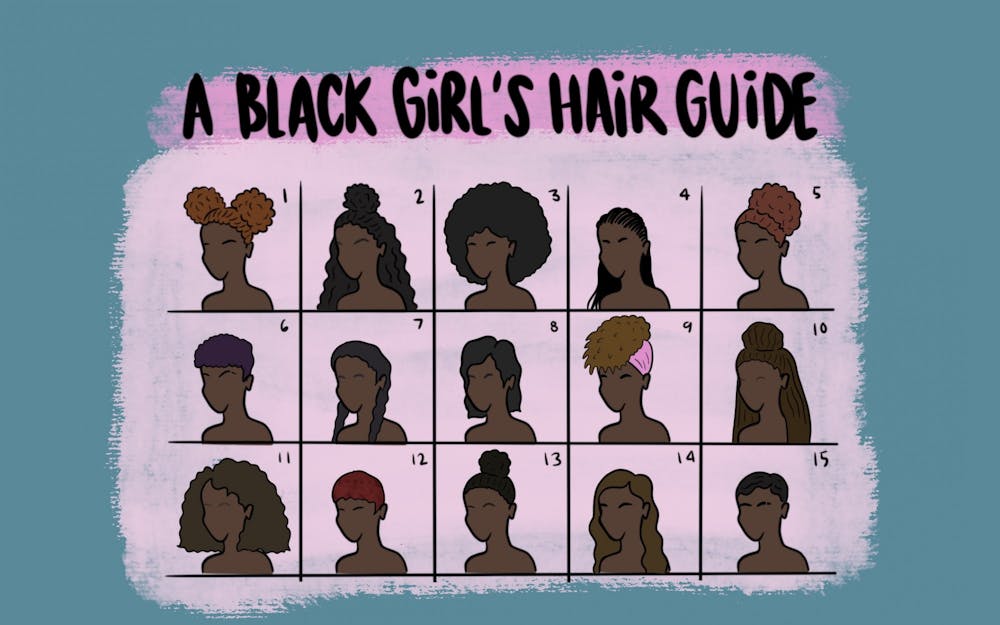IU senior Deja Bush walked into her stress and resilience class with a different hairstyle her peers were not used to seeing, a natural hair puff — an updo commonly worn by people with Afro-textured hair.
At the end of class, her professor asked her, “Is that all your hair?”
Bush smiled and gave a short answer of, “Yes, it is.”
It’s been two years since that day, and while the lecture may be a distant memory to her, the encounter with her professor and the uncomfortable feeling she had as she walked out of the classroom remain with her today.
“I was stunned,” she said. “I understand Black people’s hair can change quickly, but it doesn’t always have to be commented on in that way.”
Hair discrimination is used to prohibit natural hairstyles and justify removing Black people from professional settings, according to NAACP Legal Defense and Educational Fund. To combat the hair discrimination many people have undergone, the CROWN Act — which stands for Creating a Respectful and Open World for Natural Hair — was created and passed in many states such as California and New York.
The CROWN Act was passed by the U.S. House of Representatives on March 18, and the bill now heads to the Senate for review, bringing the bill one step closer to becoming federal law.
“If you want, show them your true authentic self,” Bush said. “Free the coils. We are coming into a new era. I feel like it is not appropriate to bash women of color and other ethnicities because of their hair. It doesn’t deem them unprofessional or unfit to do their job in a professional setting.”
Campus Curls and Coils, a student-led organization at IU, was created for Black students who are interested in natural hair and to inform other people of the importance of natural hair. Current executive board member Anaijah Dunn believes this organization can also be viewed as the result of hair discrimination in the professional realm.
Coming to college, Dunn heard a lot of stories from her friends about their experiences with hair discrimination when looking for jobs, internships and other professional experiences to put on their resumes.
“Most of the hairstyles, if not all of the hairstyles that are discriminated against are all hairstyles worn by African Americans and people of color,” she said. “Even something as simple as hair is still targeting a group that has been targeted for so long.”
Dunn herself had not explicitly experienced judgment because of a hairstyle. However, she did acknowledge there have been instances where she could have been judged for her hair texture and style but did not even know it.
“Even though I haven’t experienced it personally, it doesn’t change the fact that it affects people like me,” Dunn said.
IU senior T’Kai Isidahmen expressed feelings of internalized hair discrimination.
The last time Isidahmen could remember herself wearing her natural hair out in public was in high school.
“I don’t give people the chance to even (discriminate) against it,” she said.
Since then, Isidahmen keeps her hair in protective hairstyles, disallowing many people the chance to see her natural hair and judge it. Protective hairstyles are methods in which a person styles curly hair to protect it from stressors, such as heat manipulation, while also reducing tangling and/or breakage of the hair.
Some common protective hairstyles among the Black community are box braids, twists, cornrow braids, Bantu knots, wigs and locs. However, some of these protective hairstyles, such as locs, have a long history of being discriminated against in the workplace and at school.
During a 2018 wrestling match in New Jersey, Andrew Johnson, a Black teenager, was forced to cut his locs after the referee told him he would forfeit the match if he did not cut them. Instances like this are the reason the Black community finds these protections, such as the CROWN Act, to be important.
Although Isidahmen does not wear her natural hair in public, she too sees beauty in Afro-textured hair and the people who embrace their natural hair and features.
“Black is beautiful,” Isidahmen said. “Love your hair and love your Black features even when Eurocentric beauty standards are being upheld.”
While the CROWN Act still has yet to be approved by the U.S. Senate and signed into law by President Joe Biden, Isidahmen believes it is important to embrace your natural hair and show your unapologetic self to the world, whether that be wearing a protective hairstyle or an afro.




